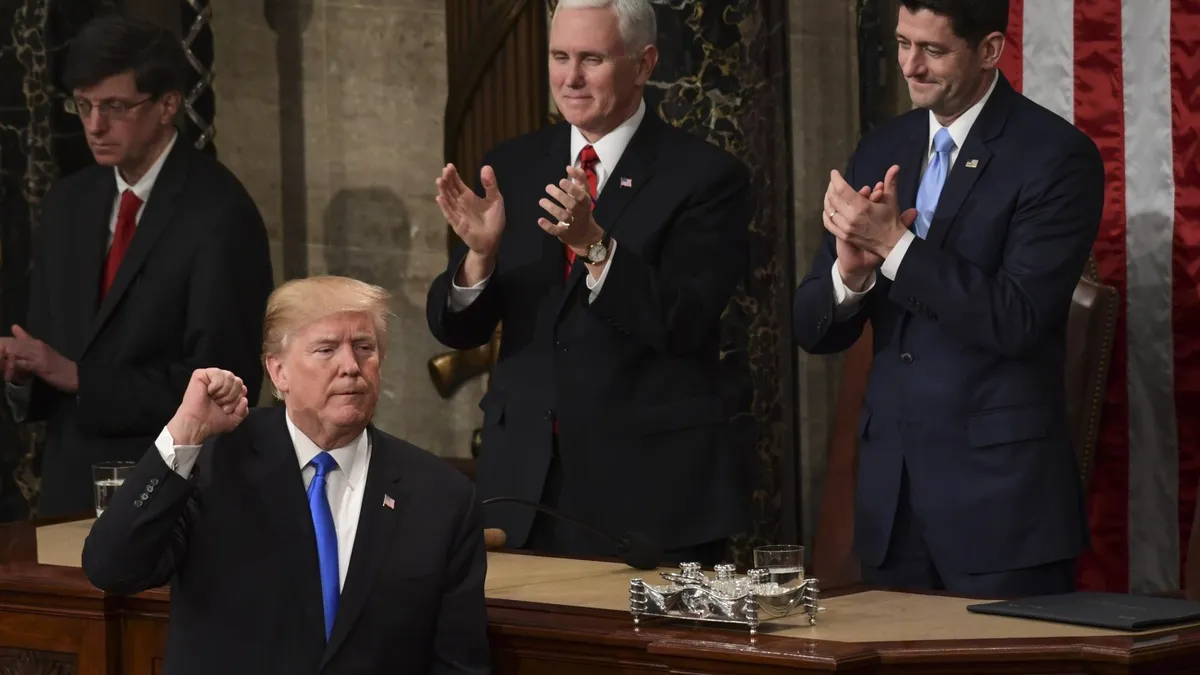
President Donald Trump is set to make a significant appearance this week on Capitol Hill, where he will deliver a speech to Congress. This address comes after a tumultuous first month in office, characterized by Trump's unprecedented use of executive power to push through his agenda both domestically and internationally. On Tuesday night, he will stand in the very chamber where lawmakers once feared for their safety during a riot instigated by his supporters four years ago.
The House chamber has witnessed pivotal moments, including a hero's welcome for Ukrainian President Volodymyr Zelenskyy as he rallied against Russia’s invasion. Trump's actions since his reelection have sparked significant controversy, as he continues to dismantle established government norms and traditions. With billionaire ally Elon Musk backing him, Trump is undertaking drastic measures, including firing thousands of federal employees and closing agencies that were created by law. His administration is also publicly pressuring Zelenskyy while inching closer to Russia.
As legal challenges against the Trump administration continue to grow, with over 100 cases questioning the legality of his actions, the Republican president is daring Congress and the courts to intervene. Rep. James Clyburn, a senior Democrat from South Carolina, remarked, “We’re already there” in terms of approaching a potential constitutional crisis. Trump's unilateral approach raises questions about the limits of his executive authority, especially as he turns to Congress for vital funding and legislative support.
Trump’s address will focus on crucial issues such as extending tax cuts and preventing an economically damaging debt default. While Congress has the constitutional authority to allocate funds, Trump's administration has operated in a manner that tests these foundational rules. The deadline for funding the government looms on March 14, and lawmakers must work together to avert a government shutdown.
Despite enjoying significant power with Republicans controlling the White House, the House, and the Senate, Trump relies on political leverage to motivate lawmakers. House Speaker Mike Johnson has expressed his enthusiasm for Trump’s initiatives, dismissing concerns about the balance of power as “nonsense.” Johnson believes that Trump is fulfilling his campaign promises by tackling waste and fraud to streamline the government.
In response to the challenges posed by the Trump administration, Democrats are slowly organizing their resistance. They are utilizing legal avenues to protect federal workers and are planning to introduce legislation to mitigate what House Democratic Leader Hakeem Jeffries describes as a “parade of horribles.” Despite being in the minority, Democrats have decided against boycotting Trump’s address, instead inviting affected federal workers as guests to highlight the human impact of his policies.
One of Trump’s primary campaign promises is to extend the tax breaks initiated during his first term in 2017. This proposal presents a significant challenge for the Republican Party, as they aim to introduce a “big, beautiful bill” that not only extends these tax cuts but also implements around $2 trillion in budget cuts affecting essential services such as Medicaid. Concerns are rising regarding the impact of these cuts on millions of Americans who rely on federal support.
Trump's ambitious immigration reform, which includes the largest deportation operation in U.S. history, is also facing funding shortages. Border Czar Tom Homan has urged Republicans to loosen budget constraints to ensure the necessary funding for Homeland Security and Defense departments. These budget negotiations are set against the backdrop of ongoing conflicts over the Trump administration's methods and its challenge to the Nixon-era Impoundment Control Act.
The specter of the January 6 insurrection looms large over Trump's address as he prepares to speak in the same chamber where many lawmakers feared for their lives. The memories of that day, when the Capitol was stormed by rioters, are still fresh for many, including Sen. Peter Welch from Vermont, who was present during the chaos. He emphasized that while Trump has the right to exercise executive authority, he must remain within constitutional bounds.
As Trump prepares to deliver his address, the nation watches closely, aware that the outcomes of this speech could have far-reaching implications for the future of governance and the lives of Americans. The stakes are high, and the balance of power in Washington continues to be tested.